About us
Studies range from fundamental basic research to applied psychology. We hope that we can contribute to making the good future of the world through our studies.
what's new
・A paper revealing that keeping a daily gratitude journal enhances work engagement has been published in the special issue "Employee Happiness and Job Satisfaction" of BMC Psychology [October 2025].
Yamagishi, N., Nawa, N. E., & Isomura, S. (2025). Enhanced work engagement in Japanese employees following a 12-day online gratitude journal intervention. BMC psychology, 13(1), 1098. https://doi.org/10.1186/s40359-025-03494-2
A joint press release for this study was issued by Ritsumeikan University, NICT, and NTT Data Institute of Management Consulting.
[LINK here]
・Professor Yamagishi Featured in Interview by SHUEISHA’s Wellness Web Journal “yoi”
Professor Noriko Yamagishi was recently interviewed by “yoi,” a wellness media platform operated by SHUEISHA, one of Japan’s leading publishers. The article, titled “What Is a Gratitude Journal? A Simple Yet Powerful Way to Boost Motivation by Listing Three Things You’re Grateful For”, introduces the science and benefits behind keeping a gratitude journal. It highlights Professor Yamagishi’s research on how this simple practice can enhance motivation and well-being.
You can read the full article here:
No.1: “What Is a Gratitude Journal?” Start the New Year Right: How Simply Listing Three Things You're Grateful for Can Boost Your Motivation
[LINK here]
No. 2: “Trying Out a Gratitude Journal” — Forget Willpower and Superstition: The Secret to Feeling Energized Might Be Gratitude! A yoi Writer Participates in Expert-Led Research
[LINK here]
【2024】
・A paper clarifying the relationship between human emotions (gratitude, self-esteem, and optimism) and subjective/psychological well-being has been accepted by BMC Psychology [March 2024].
Nawa, N.E., & Yamagishi, N. (2024). Distinct associations between gratitude, self-esteem, and optimism with subjective and psychological well-being among Japanese individuals. BMC Psychol 12, 130. https://doi.org/10.1186/s40359-024-01606-y
・A paper that developed a psychological method for inducing human emotions and showed its effectiveness was accepted for publication in PLOS ONE [January 2024].
Monno, Y., Nawa, N.E., & Yamagishi, N. (2024). Duration of mood effects following a Japanese version of the mood induction task. PloS one, 19(1), e0293871. https://doi.org/10.1371/journal.pone.0293871.
【2023】
・Professor Yamagishi was interviewed by "Wellulu," a website that provides information on wellbeing. The article is titled "Gratitude Increases Academic Motivation" and is published on Well Academy.
Here is the LINK(Japanese)
・Professor Yamagishi gave a lecture at Nikkei Business School on "Thinking Process of Leaders Overcoming Crises" (Inamori Center for the Study of Management Philosophy, Ritsumeikan University x Nikkei Business School). Hiroko Ohnari (Interbeing Co., Ltd.) was invited as a guest speaker.
Thursday, September 28, 2023 - Thursday, October 19, 2023
Total of 4 live sessions (19:00-21:30)
Session 3: Thursday, October 19
“Motivation Management to Balance Organizational Profitability and Subordinates' Happiness: Lecture on Intrinsic Motivation from Data Science and Psychological Perspectives”
For more details, click here.
・Professor Yamagishi was appointed to the Board of Directors of the Japanese Psychological Association (June 24, 2023)。
・Professor Yamagishi was appointed to the chairman of the "Committee for the Promotion of Gender Equality" of the Japanese Psychological Association (Nov.1, 2022 – Oct.31, 2024).
【2022】
・Prof. Yamagishi gave a talk at Nikkei Business school. Seminar on Leadership in a dynamically changing society
Joint seminar of Ritsumeikan Inamori Philosophy research center and Nikkei From September 29th, 2021 to October 27th, 2021 (every Thursday. 19:00-21:00) Realtime ONLINE (Japanese)
Prof. Yamgishi gave a talk about “Intrinsic motivation and well-being” on Oct. 13th Thursday.
To see more details, please visit here(Japanese)
・Preprints of a paper on “The Impact of Appreciative Emotions on Academic Motivation in High School Students” uploaded to PsyArXiv Preprints. [July 2022].
Yamanaka, T., Nawa, N. E., & Yamagishi, N. (2022, July 8). Gratitude and Academic Motivation among Japanese High School Students: A Nine-week Gratitude Journal Intervention Study. https://doi.org/10.31234/osf.io/bh483
・A paper on “Visual attention and consciousness” was published. [Feb. 2022] (Japanese)
Yamagishi, N (2022). Visual attention and consciousness. SEITAI NO KAGAKU. Vol.73(1): 23-27. DOI: https://doi.org/10.11477/mf.2425201459.
【2021】
・A paper on gratitude effects on academic motivation was accepted for publication in BMC Psychology [March, 2021].
Nawa N. E., Yamagishi, N. (2021). Enhanced Academic Motivation in University Students Following a Two week Online Gratitude Journal Intervention, BMC Psychology, Vol.9, No.1: 71. doi: https://doi.org/10.1186/s40359-021-00559-w
Here is the LINK to the Press Release (EurekAlert!) of this study.
・A paper on emotional effects on visual search in the Virtual Reality environment was accepted for publication in the journal of VR society of Japan [January 8th, 2021]. (Japanese)
Sakai M., Yonami, R., Murakami, J., Mitsugami, I., Yamagishi, N. (2021). The effect of mood state on visual search times under VR environment. Transactions of the Virtual Reality Society of Japan. Vol 26, No1. doi:https://doi.org/10.18974/tvrsj.26.1_52.
・A paper on psychological effects of short-term study abroad was accepted for publication in PLOS ONE [December 2021]
Yamanaka, T., Yamagishi, N., Nawa, N.E., Anderson S.J. (2021). Assessing changes in mood state in university students following short-term study abroad. PLOS ONE 16(2): e0261762. https://doi.org/10.1371/journal.pone.0261762.
・Prof. Yamagishi gave a talk at Nikkei Business school.
Seminar on Leadership in a dynamically changing society
Joint seminar of Ritsumeikan Inamori Philosophy research center and Nikkei from September 29th, 2021 (Wed.) to October 20th, 2021 (every Wed. 19:00-21:30)Realtime ONLINE (Japanese)
Prof. Yamgishi gave a talk on “Intrinsic motivation and well-being” on Oct. 13th.
【2020】
・Prof. Yamagishi started writing a blog that covers topics of Gratitude and her research interests. [September 21st, 2021] (Japanese)
please access here
Research on mechanisms underlying visual dynamics
As ubiquitous computing is becoming a central concern of everyday life, it is a very important issue to understand a user's internal status in order to provide them with useful information at the appropriate time and place. To determine the best time and place to provide information to users, we are developing a technique for predicting users' attentional status and readiness levels for a task by evaluating brain activity [Figure 1]. This technique enables us to get information carried by telecommunication devices very easily and naturally, and high task performance would be supported for everyone from young to elderly users.
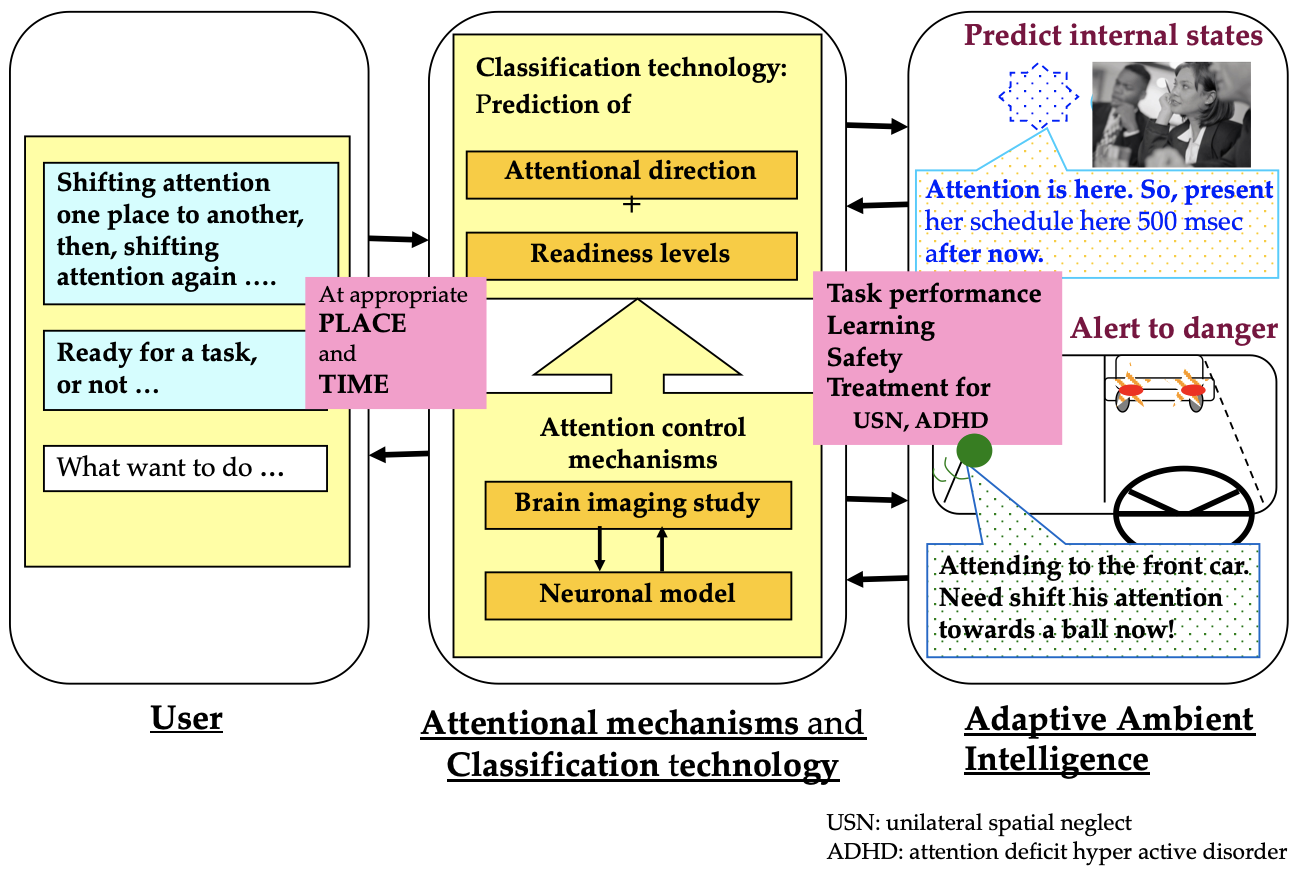
Figure 1
2. Mechanisms underlying visual attention
Attentional status and readiness level largely affect human perception, performance and memory.
Series of our visual attention studies with psychophysical and brain imaging techniques revealed that, in the human early visual cortex, shifting attention towards an expected visual target resulted in a late-onset (600 ms postcue onset) depression of alpha activity (ERD: event-related de-synchronization) which persists until the appearance of the target [Figure 2].
The levels of ERD were correlated with the visual task performance [Figure 3].
These results indicate that the alpha de-synchronization in the early visual cortex has important roles of human visual shifting attention.
|
Time/frequency analysis Event-related spectral perturbation (ERSP) |
Correlations between ERSP and ACC | |

|

|
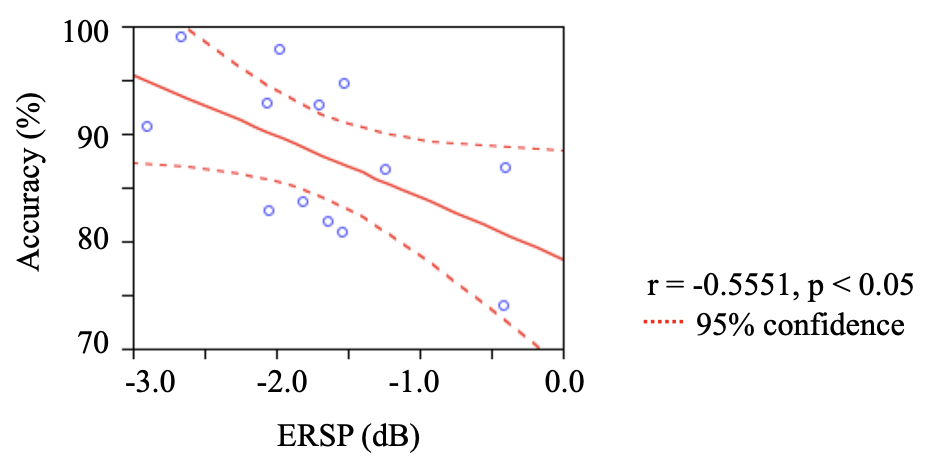
|
|
|
|
|
3. Human Emotion (happiness level) and visual attention
The effects of human emotion, such as happiness level, on the visual attention is investigated by using psychophysical methods and brain imaging techniques.
One approach to study this topic is to record participants’ emotional status in daily life, and participants conduct psychophysical tasks, by using their smartphones. To do this, we can investigate relationship between natural emotional changes and human visual task performance. Our study showed that when people were happy, people searched the target faster in the distractors [Figure 4].
Further, we conduct psychophysical experiments on this topic in the laboratory setting to test hypotheses, and brain imaging studies to reveal neural mechanisms underlying the relationship between human emotion and attention.
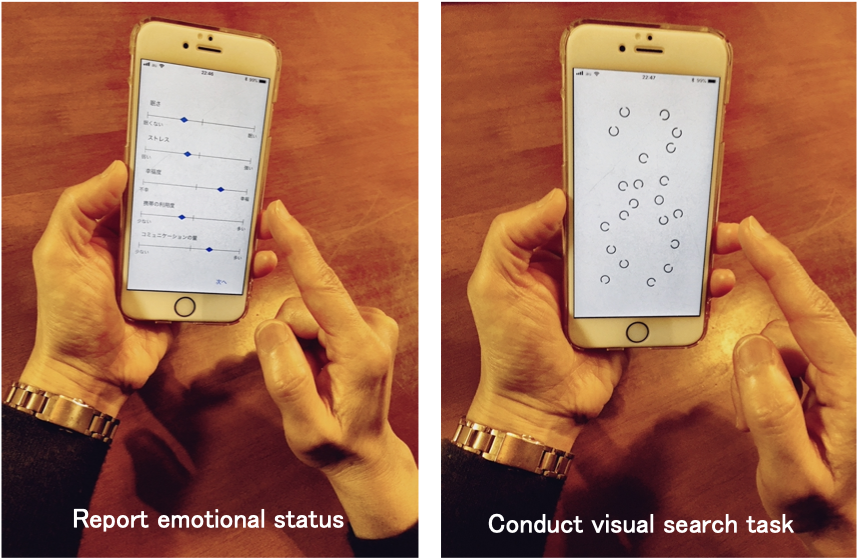
|
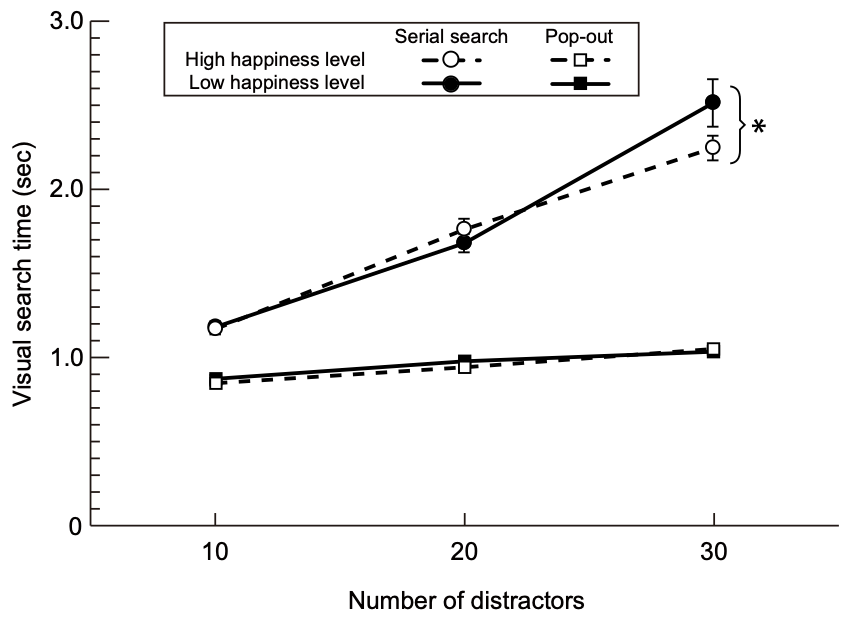
|
4. Gratitude and human motivation
One of human positive emotions, Gratitude, and motivation is investigated by WEB based interventions. Participants in the study are asked to write gratitude journal for a several weeks to elevate their gratitude levels. Some psychological statuses including academic/work motivations are asked before and after the intervention.
The results of the study revealed that a short intervention of the gratitude increased university students’ Academic Motivation (Figure 5).
We are hoping that we can develop the gratitude based educational system to improve motivations based on our study results.

Figure 5
Grants obtained
| 2019-2023 |
Principal Investigator JSPS KAKENHI Grant number 19H00635 Grant-in-Aid for Scientific Research (A) Research title: ‘Detecting and healing mental disorder by using attentional function system’ |
| 2018-2019 |
Principal Investigator 2018 WASEDA University –NICT matching fund Research title: Predicting mental disorder before symptoms appear by brain scientific approach. |
| 2018-2019 |
Principal Investigator RITSUMEIKAN University INAMORI PHILOSOPHY RESEARCH CENTER Research project Fund Research title: Positive chain of gratitude - Psychological and neuro-scientific approach to understand it - |
| 2018-2020 |
Co-investigator 2018 WASEDA University research fund Research title: Preparation for a study on predicting mental disorder before symptoms appear. |
| 2016-2017 |
Principal Investigator RITSUMEIKAN University INAMORI PHILOSOPHY RESEARCH CENTER Research project Fund Research title: What is ‘Appreciation what we have’ - Neuro-scientific approach to understand it - |
| 2014-2017 |
Principal Investigator JSPS KAKENHI Grant number 26540075 Grant-in-Aid for Challenging Exploratory Research Research title: ‘Investigation of relationship between attentional training and happiness level’ |
| 2013-2016 |
Principal Investigator JSPS KAKENHI Grant number 25280053 Grant-in-Aid for Scientific Research (B) Research title: ‘Investigation of brain mechanisms underlying readiness levels for behavior tasks’ |
| 2009-2013 |
Principal Investigator PRESTO (Precursory Research for Embryonic Science and Technology), Japan Science and Technology Agency (JST), ‘Information Environment and Humans’ Research title: ‘Towards providing useful information to users at the best time and place by predicting internal state from brain activities’ |
Members
Faculty
Professor Noriko Yamagishi
Senior Researcher
Haruho Umamichi(Ritsumeikan University)
Students
Currently accepting students for Research Seminar
(Thesis research using experimental psychology methods)
Student staffs
Raiki Ito(Osaka University)
Collaborators
Norberto Eiji Nawa(NICT CiNet)
Stephen J. Anderson(Aston University)
Rieko Osu(Waseda University)
Hiroaki Kumano(Waseda University)
Ikuhisa Mitsugami(Ritsumeikan University)
Toru Maekawa(Hiroshima University)
Tsukasa Yamanaka(Ritsumeikan University)
Takuya Ibaraki(NTT data)
Yasunaga Monno(Tokyo Institute of Technology)
Call for participation
WEB online experiment
Planning now
Psychological experiment
Planning now
fMRI experiment
Planning now
Access
OIC campus
2-150 Iwakura-cho, Ibaraki, Osaka 567-8570 JAPAN

|

|
Office
Room AC5415
(Ritsumeikan University, OIC campus, Building A 5th floor)
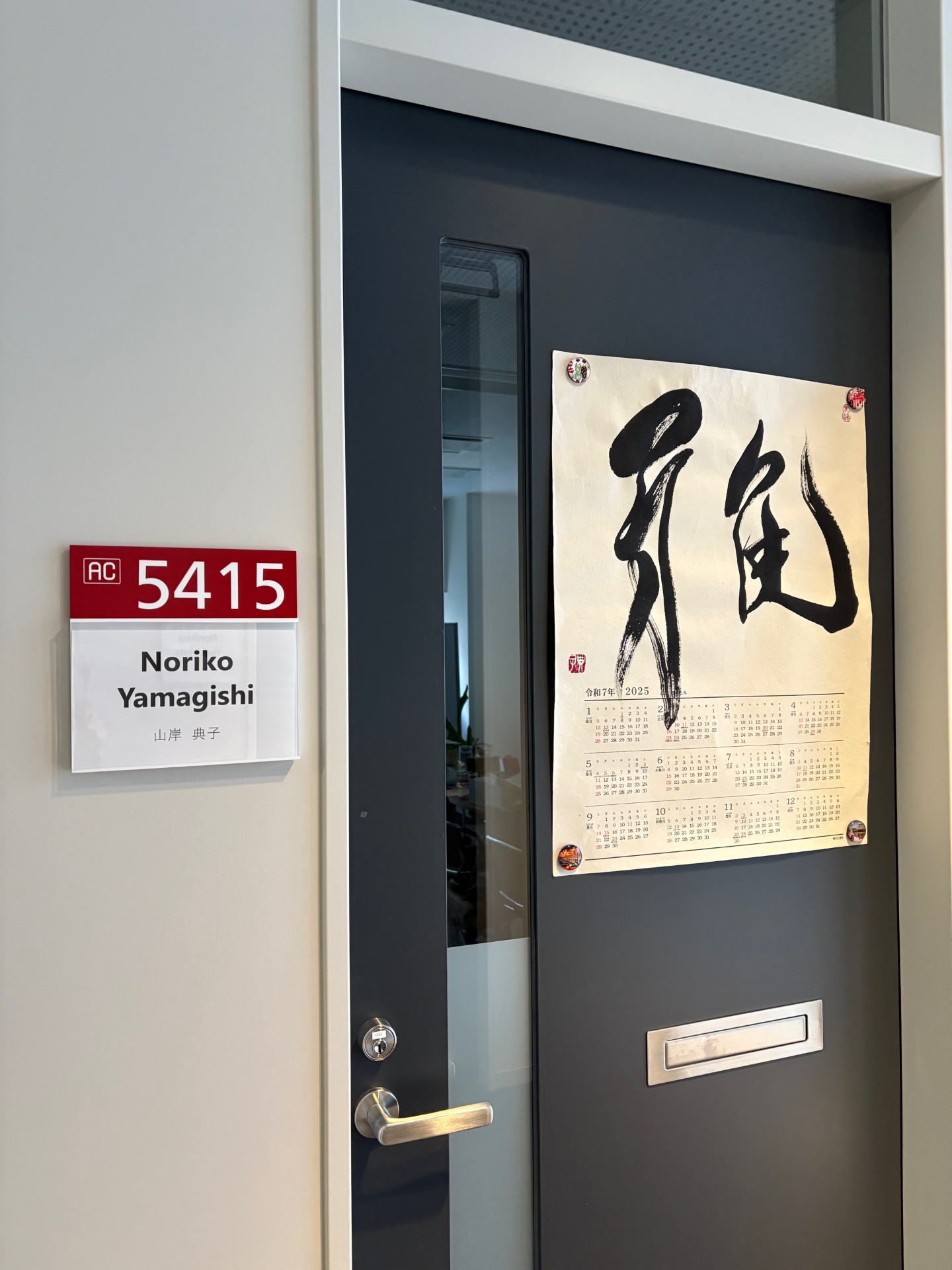
|

|
Contact
yamagisi (at) fc.ritsumei.ac.jp(change (at) to @)
Phone
0726-65-2740 (International +81-726-65-2740)
Office hour
by appointment

